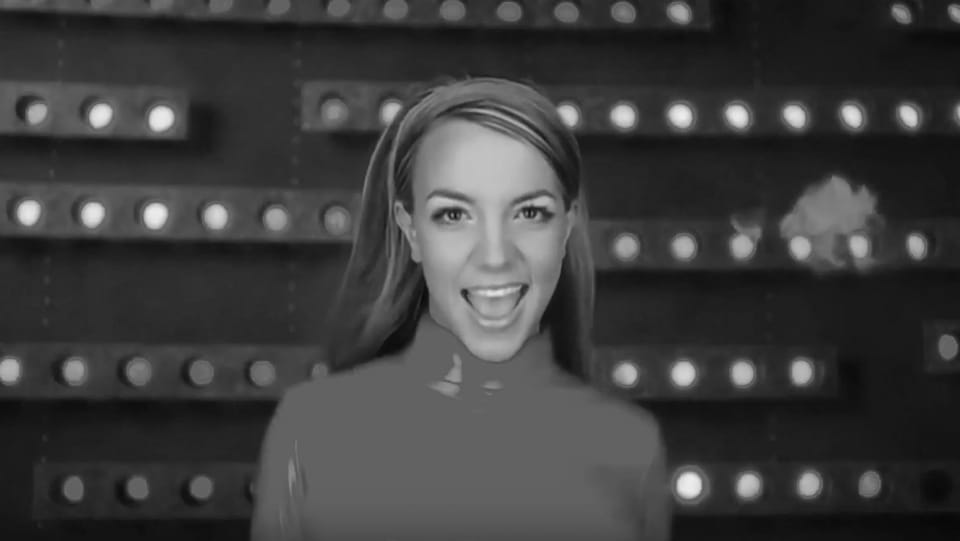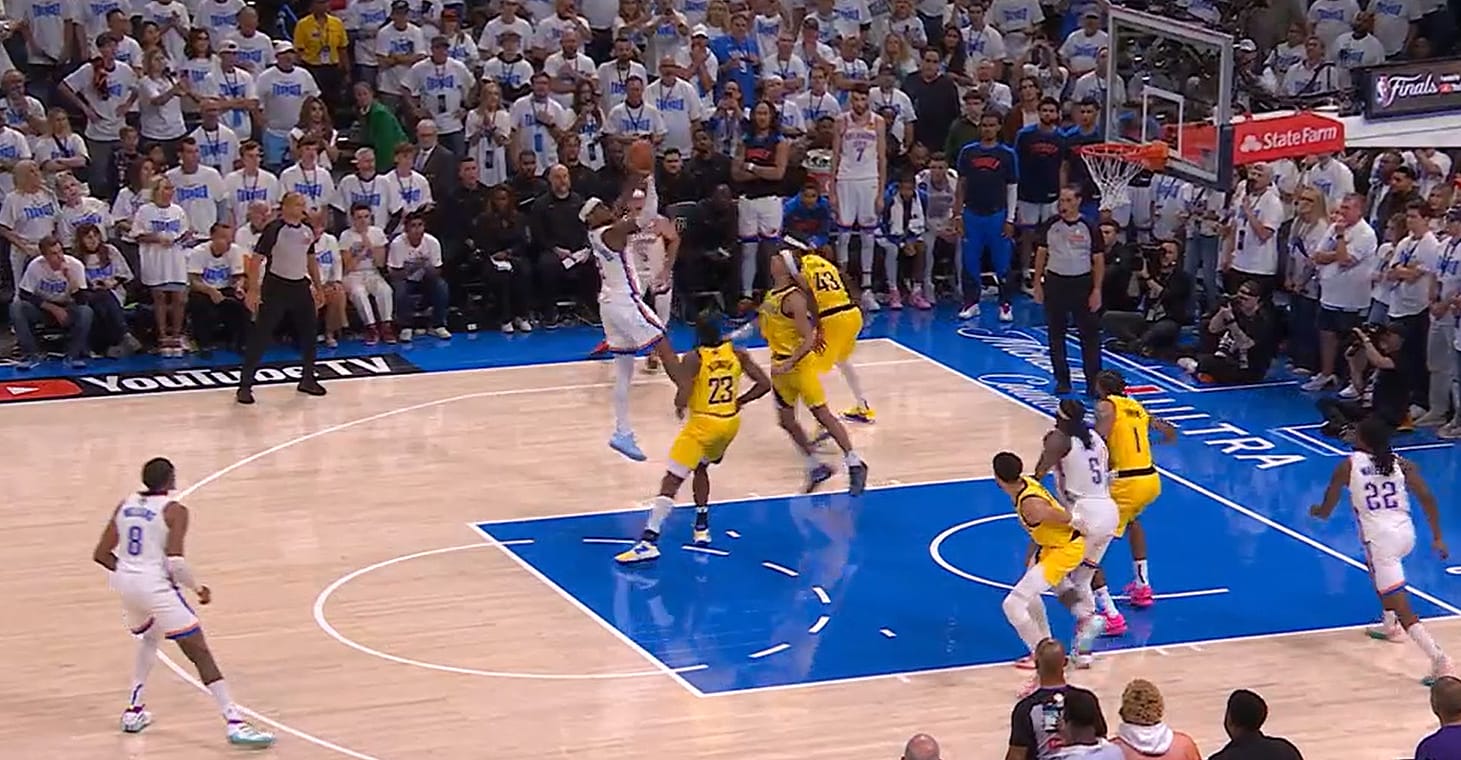Oops!...He Did It Again

It is a seldom remarked-upon truth that a team only needs to lead a sporting contest at the final buzzer. Usually, that is just not relevant, because big comebacks are rare (or, they used to be), and a team leading wire to wire is even more rare (at least in basketball). But it was relevant tonight. After taking a 2-0 lead, the Oklahoma City Thunder would lead for the next 46 minutes and 25 seconds. But they lost, because they lost the lead with 0.3 seconds left. Such is the brilliance of Tyrese Haliburton. However, while it took Indiana the entire night to claw their way back in front, once they got out of their own way, they not only the better team, but played with the same strategy that they have for the past two seasons. Oklahoma City made a lot of curious decisions, had a bunch of subpar performances, and played right into Indiana's hands.
Let's start with OKC playing right into Indiana's hands. One thing that gave Indiana a lot of trouble in the earlier rounds was double big lineups, particularly Mitchell Robinson and Karl-Anthony Towns in the Conference Finals. Indiana just doesn't have a lot of frontcourt depth, and that can have a couple of ramifications. First, simply, NY was able to outrebound the Pacers. They were +33 for the series, and outrebounded the Pacers in five of the six games. Second, if Myles Turner gets into foul trouble, the Pacers don't have a lot of great answers. Thomas Bryant is good for 5-10 minutes a night (8:07 tonight), and that's it. Otherwise it's playing small with Obi Toppin. And yet, OKC decided to not try and press their advantage, and left their second-highest paid player on the bench to start the game.
It's one thing if they had tried their double big lineup – which had started every other playoff game – and it didn't work. But they just didn't try it at all. In addition, the Thunder didn't crash the offensive glass real hard, choosing instead to get back and take away Indiana's transition/fast-break offense. So the Pacers just beat them on the glass. The Pacers pulled down a playoff-high 56 rebounds – nine more than they had pulled down in any other playoff game this season, and 17 more than OKC. It was just the third time this postseason that a team pulled down 56+ rebounds in regulation (only two others have pulled down 55). One of the other two times was Game 1 of the second round, when the Denver Nuggets pulled down 63 rebounds against the same Oklahoma City Thunder. In that game, OKC was outrebounded by 20, and Denver won by two on a similar last-second shot from Aaron Gordon.
For most of the game, OKC only played one big – either Chet Holmgren or Isaiah Hartenstein. But a couple of times, they went with zero bigs. One of those stretches was the final 3:24 of the game. Holmgren was subbed out for Cason Wallace, and the Thunder played all but the final 0.3 with zero bigs, going with a lineup of Shai Gilgeous-Alexander, Jalen Williams, Lu Dort, Alex Caruso, and Wallace. And the Pacers murdered them. At the time of the substitution, OKC was up 106-98. The Pacers would finish on a 13-4 run, with the Thunder only getting one bucket from the field – an SGA fast-break lay-up. With three players who couldn't create their own shot in Caruso, Dort, and Wallace, and Williams suffering through another subpar shooting night (6-for-19), the Thunder were more or less playing a prevent offense, and just hoped SGA would bail them out. He didn't. He missed his final two shots. The first was blocked, but the second – with 11 seconds left – was as clean a look as he had had all night. He just missed it.

Tyrese Haliburton came back down the other end and didn't miss. Ballgame.
Beyond playing into Indiana's hands by going small, OKC made a few other curious decisions. For one, they played rookie Ajay Mitchell for four minutes in the second quarter. And even stranger still, gave him the green light to take three shots. He missed all three, and was never heard from again. A player who had been effective for them in prior rounds was Kenrich Williams. He only played for 39 meaningless seconds at the end of the first quarter. Perhaps OKC was pre-worried about Indiana's tendency to play a lot of guys, but again, you should make the other team prove that your baseline strategy is ineffective before switching up, because your baseline strategy is what your players are most comfortable with. These seemed like unforced errors from Oklahoma City.
There were others. Because OKC was determined to play just one big all night, Chet Holmgren only played 23:31 – good for just sixth on the team. Holmgren is conservatively OKC's third-best player. A lot of nights, he's their second-best player. That math doesn't math. As a result, Cason Wallace played 33 minutes, something he had done in only one of the prior 16 playoff games. In the other 15, he didn't play more than 28 minutes, and in 11 of those 15, he didn't play more than 24. Wallace is just not a dynamic scorer. In these 17 playoff games, he has scored a total of 92 points, an average of just 5.4 points per game. The Pacers had to be thrilled that he stole minutes from Holmgren and Hartenstein. Hartenstein scored more points (seven) in his 4:40 of action in the first quarter than Wallace did for the entire game.
Then there were the subpar performances. Lu Dort hit five of his seven threes in the first three quarters, which masked OKC's struggles from deep. He would miss his two in the fourth quarter, and no one else hit either – as a team, OKC was 0-for-5 in the quarter. For the game, Dort was 5-for-9 from deep, SGA was 3-for-6, and the rest of the Thunderers were just 3-for-15. No one else hit multiple three's. Indiana did a fantastic job of cutting off SGA's outlet oxygen. They have done this over and over in the postseason, particularly against Cleveland. In that second-round series, Donovan Mitchell took a total of 125 shots. The next-highest Cav was Max Strus, with 57 field-goal attempts. Mitchell only averaged 3.8 assists per game for the series, after averaging 5.0 in the regular season. The differences tonight weren't as stark, but the Pacers were able to cut off SGA's outlet oxygen. SGA averaged 6.4 assists in the regular season, and has averaged 6.9 in the playoffs, racking up at least four in every game, and at least six in all but three. Tonight, he had just three. The Pacers forced him to do everything, and while he had 38 points, it wasn't enough, and no one else came along for the ride because the Pacers didn't give the supporting cast hardly any easy shots.
Add it all up, and it feels like the main reason that OKC led the game for as long as they did was because of how badly Indiana controlled the ball in the first half. In the first half, Indy committed 19 turnovers, which crucially led to OKC putting up 19 more shots. Many of these were the result of the refs putting their whistle away, but a lot of them – particularly two horrible passes to no one by Toppin that led to backcourt violations – were their own horrible plays. But in the second half that calmed down, and because OKC didn't pull away in the first half, Indy was able to chip away at the lead, never letting up, and never saying die. Obviously, the Pacers rarely commit 19 turnovers in a single half of basketball, because they averaged just 13.2 turnovers per game in the regular season, and 12.7 in the playoffs entering tonight, so you can't necessarily count on them doing that again.
The other thing that would worry me if I was OKC is that no one on Indiana really had a great night shooting-wise aside from Toppin, who was 6-for-9. Haliburton was 6-for-13, Siakam was 7-for-15, Myles Turner was 5-for-10, Andrew Nembhard 4-for-11, and Aaron Nesmith was just 3-for-9. TJ McConnell was 4-for-6, but aside from the three, they were easy shots he'd hit on any night. In other words, the Pacers didn't win this because they had flames shooting out of their butts like they did when Aaron Nesmith hit all those threes in Game 1 in New York. The Pacers won this by dominating the glass, playing stout-ish defense, and taking care of the ball when it counted.
I would expect OKC to come back with a vengeance in Game 2 and tie this right back up. But Mark Daigneault suddenly has some decisions to make. Is he going to keep rolling with the single-big lineup? If yes, is he going to crash the glass more? Either decision could lead to Indiana getting out in the open floor for more easy buckets. Then again, OKC spent all night getting back to try to prevent just that, and held a team that averaged 89.3 field-goal attempts per game to just 82. And Indiana still scored 111 points and won anyway. When OKC has the ball, if Jalen Williams can't be effective, is he going to turn to Chet Holmgren more to create offense? And if not, where exactly is the offense going to come from? It was great that Lu Dort hit five threes tonight, but that was the first time he has done so this postseason. The Thunder are still clearly the better team on paper, but winning the championship takes everything, and you only get to have so many unforced errors and subpar performances, even when you're the better team on paper. Tonight, all of that led to the Pacers having a chance at the end, and once again, Tyrese Haliburton channeled both Omar Little and Britney Spears (a tough combo, to be sure). And now we have a series.
